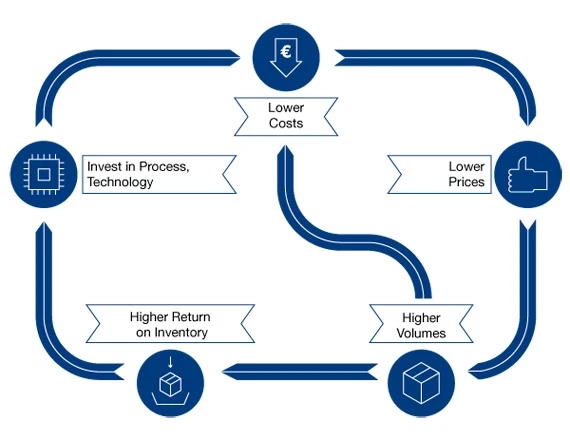Digital advancements powerfully transform how businesses operate. They reshape every sector and industry. As companies navigate opportunities and challenges, understanding this change is crucial. Technology revolutionizes business functions. It redefines how companies interact with clients, rivals, and staff. Data analytics guide strategic decisions. Cloud computing enables operational flexibility. Technology drives contemporary strategies. It fosters growth, efficiency, and innovation at businesses' core.
The Digital Transformation of Business Operations
Digital transformation fundamentally alters value creation and service provision. Embedding technology into all aspects changes operations. Organizations enhance processes, boost productivity, maximize profits. Automation and AI lead this shift, streamlining inventory control to customer engagement. This lets companies specialize in expertise and innovation. It introduces efficiencies once unattainable. Cloud adoption provides needed flexibility, scalability to adapt rapidly. This paradigm enables efficient, adaptive operations - key for competitiveness in dynamic digital landscapes.
E-commerce and the Rise of Online Marketplaces
E-commerce has transformed retail. Businesses now access global audiences easily. Online marketplaces removed barriers to market entry. Businesses of all sizes can reach worldwide customers. This shift changed consumer shopping habits. Brick-and-mortar retailers evolved, adopting omnichannel strategies. They integrated online and offline shopping experiences seamlessly. The digital-first approach in commerce allows businesses to cater to modern consumer convenience and preferences. A wide range of products and services are available at customers' fingertips. E-commerce platforms democratized retail through accessibility, spurring innovation. Businesses leverage digital tools to enhance visibility, customer engagement, and operational efficiency. In this evolving digital economy, agility and strategic use of e-commerce platforms drive business success and sustainability.
Good To Read :- Enterprise Software Solutions for Business Transformation
Enhancing Customer Experience Through Personalization
Personalized customer experiences are game-changers in today's digital marketplace. Companies analyze vast data to understand individual customer preferences and behaviors using advanced technologies. This insight allows customizing marketing messages, offers, and product recommendations tailored to each customer. Precision in personalization enhances the shopping experience, significantly increasing customer engagement and loyalty. Meaningful interactions foster deeper connections with audiences, encouraging repeat business and positive word-of-mouth. Strategic application of personalization technologies optimizes marketing efforts, ensuring resources target the most receptive audiences, maximizing return on investment. In this era where customers expect businesses to understand and cater to their unique needs, mastering personalization is essential for delivering superior customer experiences and securing a competitive edge.
The Impact of Social Media on Branding and Engagement
Social media has radically transformed how companies interact with customers. It provides unique chances for brand building and direct engagement. Companies can create compelling content, team up with influencers, and launch targeted campaigns that connect with their audience through strategic social media use. This not only boosts brand visibility but also encourages customer interaction and feedback. It opens a two-way channel invaluable for understanding customer wants and needs. Social media's real-time nature allows for prompt customer service responses. This helps build trust and loyalty among consumers. Plus, analytics from social platforms enable businesses to measure strategy effectiveness and adjust tactics instantly, ensuring optimal marketing outcomes. Engaging customers on social media isn't just about promoting offerings; it's about fostering a community around your brand where customers feel valued and heard.
Must Read :- A Complete Guide to Enterprise Mobility Solutions for 2024
Blockchain and the Future of Secure Transactions
Blockchain tech is poised to significantly alter secure transactions, marking a groundbreaking shift toward decentralized, immutable ledgers. Its application transcends cryptocurrencies, promising enhanced transparency and efficiency across industries like finance, healthcare, and supply chains. Facilitating secure, transparent transactions, blockchain introduces unprecedented trust and reliability. Smart contracts, which auto-execute agreements when conditions are met, illustrate blockchain's potential to streamline operations and curb fraud. Tokenization, converting asset rights to digital tokens, could revolutionize asset/investment management. As industries grapple with data security and transaction integrity challenges, blockchain emerges as a compelling solution redefining digital transaction and trust principles.
Fostering Innovation Through Technology Incubators and Accelerators
Technology incubators aid new firms in developing novel ideas. These programs supply resources, guidance, and networking opportunities essential for startups. They give entrepreneurs access to funding, tech expertise, and business strategy advice. Incubators provide an environment for trial-and-error, product refinement, with low failure risk. Tailored mentorship from industry veterans and peers fosters an invaluable collaborative culture. Startups gain insights for overcoming launch challenges. Incubators facilitate connections with potential investors and partners, enhancing market reach and scalability. This supportive ecosystem is crucial for transforming innovative concepts into viable businesses that drive evolution across industries.
Preparing for the Future: The Importance of Digital Literacy
In our rapidly evolving digital age, organizations must prioritize digital literacy for teams. This extends beyond current tool usage—it requires comprehensive understanding of leveraging technologies for business goals. Thriving in the digital revolution demands a workforce adept at navigating and exploiting digital resources. Technical skills combine with strategic mindsets identifying digital opportunities. Investing in educational programs enhancing digital competencies empowers employees to contribute effectively to digital transformation journeys. As digital landscapes shift, fostering environments encouraging continuous learning and adaptation becomes vital. This sustains relevance and excellence in the future competitive landscape.
Ready to revolutionize your projects? Hire Dedicated Developers in India and achieve excellence!
Wrapping up
In conclusion, technology reshapes business models. No question, it drives progress - innovation, efficiency, growth everywhere. Digital transformation remakes industries. E-commerce thrives as digital channels expand. Personalization sharpens customer experiences. But it doesn't stop there! Blockchain revolutionizes secure transactions. And social media? Now brands form tighter bonds. Support from tech incubators fuels startup growth as digital literacy takes priority. Embrace technology or stay behind. For businesses to compete, adaptation's key. The market changes rapidly. Agility required. Seize tech-driven chances, excel.


